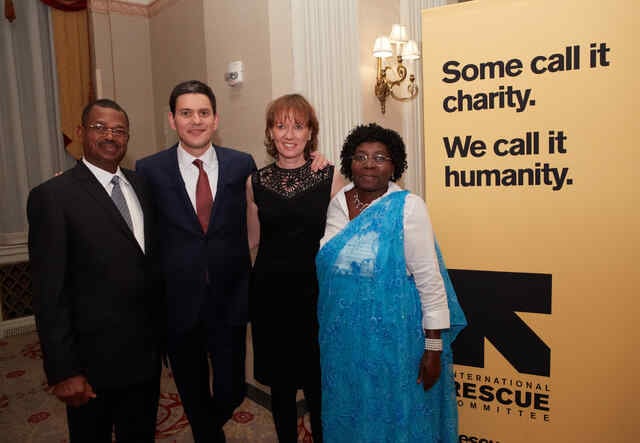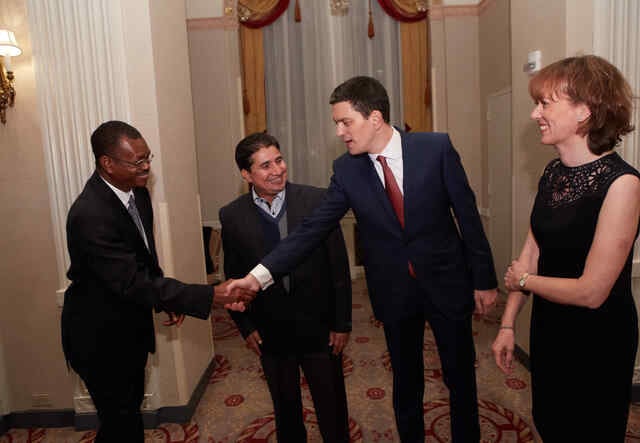Written by: Nisha Datt, Communications Coordinator
The number of displaced people has reached an all-time high at 110 million (via. UNHCR Release). As countries worldwide are experiencing climate change, conflict, and disaster, people are merely trying to survive when forced to flee their home countries, resulting in millions of young adults and children needing additional educational support when they arrive in the United States.
The year was 1972
"I remember when I left my country, I left everything behind. The only thing I had was my student card. The only clothes I had were those I was wearing," Vital recalled. Originally from Burundi, Vital was one of thousands of Burundians forced to flee in 1972. At 19 years old, he lived in a temporary center that hosted refugees in the Democratic Republic of the Congo (DRC), formerly known as Zaire. He spent ten years in the DRC and continued his education despite the challenging circumstances. "I completed my high school there and attended college also. After obtaining my bachelor's degree in education sciences, I spent three years as a teacher in high school," Vital shared.
Vital returned to Burundi in 1982, where he worked as a journalist for ten years before he and his family moved to Sweden, as his wife was offered an opportunity to be the Ambassador of Burundi to Sweden. "I worked in Diplomacy, and I spent five years in Sweden. My family was based in Stockholm, but we covered other Nordic countries -- Finland, Denmark, and Norway," he said.
Building a community
In 2000, Vital, his wife, and three children, came to the United States, where they were granted asylum in Atlanta, Georgia — with the hope of connecting with and helping other Burundians, Vital, and his friends founded an organization called the Association of Burundians and Friends of Burundi in Atlanta (ABABA). "I met many Burundians new to the USA, arriving from refugee camps. Many of them were of low literacy and had no English language skills. My friends and I tried to imagine something to help those Burundians integrate into society," Vital expressed. His first position was Secretary, but soon after the organization's founding, Vital was later elected the group's President.
The formation of a local drumming group called the Burundi Drummers and Dancers of Atlanta was also established to preserve the century-long Burundian tradition. Historically, this drumming practice is passed down from generation to generation and performed by men during funerals, ceremonies, and celebrations. The drums, meticulously crafted, are made by hollowing-out wooden trunks, wrapped in cow skin, and then stabilized with wooden pegs (via. New York Times).
Making #RefugeesWelcome since 2005
An International Rescue Committee (IRC) staff member recognized Vital's continued commitment to providing resources to the Burundian community and invited him to apply for a Caseworker position on their team. "She knew what I was doing with the Burundian community, and she came to me and asked if I was interested... I started working with the IRC in Atlanta in August 2005," he recalled. At that time, the IRC in Atlanta primarily welcomed clients from Somalia, Eritrea, Burundi, and some from Iraq and Burma. "My role was to ensure that all the families received the core services on time," Vital shared.
Three years later, in 2008, Vital transferred to the IRC in Phoenix, where he joined the education team as the Parent Teacher Student Coordinator. In this role, he has been responsible for school orientations and enrollment, organizing workshops on various topics for parents and children, and representing the IRC at school meetings and within the community. "In the network, I have built strong and meaningful connections with school principals, school counselors, school psychologists, administrators in different school districts, and the state refugee resettlement program," he shared.
Power of education
Adjusting to life in a new country comes with its own unique set of challenges. The IRC is proud to welcome clients from all over the world who hope to start anew. With over 15 programs in the Phoenix office, our team offers psychosocial and educational support,community resources, language development courses, and more. "Education is a very important tool, which opens doors that [refugee clients] would not have even dreamed of if they hadn't come to this country," Vital expressed.
Through the Education program, Vital and his team, work with parents, school-age children, and local schools to ensure children have all the resources they need to succeed in the classroom. "It is a huge blessing for them to be in schools in the USA so that their children can get the opportunity to study...my role is to make sure [their] child studies in the best conditions," Vital said.
Outside of the IRC, Vital remains connected with the Burundian community. He sits on the board of a non-profit organization that he founded called the Burundi American Association for Humanity and Opportunities (B.A.A.H.O.). “I have opportunities to connect with many other community leaders to discuss programs that can be of interest for our communities,” he shared.

18 years of service
By serving as a liaison between the IRC and local schools, participating in the coordination of workshops, and handling school enrollment for students with disabilities, it is easy to get absorbed in the day-to-day responsibilities. The impact of the Education program goes well beyond that. In his 15 years of working for the IRC in Phoenix, 18 years in total for the IRC, Vital has maintained relationships with school faculty and other resettlement agencies and seen children he enrolled in the program go forward and achieve their goals. "The different activities organized for parents and students have resulted in more success for children in school. I have seen several children who have received our education who are now engineers, teachers, social workers, or are serving in the community in healthcare," Vital shared.
Due to his close ties within the community over the years, he joked, "I can't hide anywhere! I go to church, community meetings, and I meet parents who I have served... I am proud to meet all those families I served 14 years ago, 10 years ago, 5 years ago, and I see that what I have done is worth it."
An essential aspect of his role, and his favorite part, is initial one-on-one meetings to connect with parents and their children. "I am always amazed by the excitement of families when they learn something about the American school system when I inform them that school is free – education [up until high school] is free," he shared. During these interactions, Vital always asks the children, "What do you want to do in the future when you finish your education?"
"They tell me, I want to be an engineer, I want to be a pilot, I want to be a teacher, I want to be a social worker, I want to be a police officer, a firefighter," he shared. Hearing those responses motivates Vital to continue advocating for students and their well-being at school.
A night to remember
As a result of Vital's work with the education program, he was recognized at an annual event hosted by our office in New York. A core memory that will remain close to Vital's heart was when he was presented with the Humanitarian Service Award in the fall of 2013 during the IRC's annual Freedom Dinner in New York.
He and his wife were invited to attend; it was their first time visiting the city. "This reward reminds me of my work in 2013 and the work I still do for the families and students," he shared. He remembered Former President Bill Clinton sharing a few words at the event seeing Former United States Secretary of State Madeline Albright and meeting the IRC's President and CEO, David Miliband. "When I saw the people invited to the ceremony, I saw many people were ready to help support the IRC's efforts -- I am not alone," Vital expressed.
With time comes change
Change is inevitable, but how we react and adapt to it makes all the difference. Throughout his time working at the IRC, Vital has observed many changes. "One of them has been the diversification of services provided by the IRC, which is excellent because services are invaluable for all our clients," he shared. The emergence of the COVID-19 pandemic forced program teams within the IRC to re-imagine new ways to serve their clients safely. "We had to be creative in imagining new ways of serving clients," he added.
Proud to #StandWithRefugees at the IRC
Vital's abundance of patience is a virtue and has served him well in his career with the IRC. "I know that the work we do is not easy. We deal with people from different cultures and backgrounds... if [our clients] are successful, it will be a source of pride for us," he explained. Being a former refugee, he understands what his clients have gone through, allowing him to lead and serve with empathy.
The values he instilled in his children around education when they came to the U.S. are the same values he shares with and hopes for the families he works with. "When I meet the youth in school, I encourage them to continue their education – education is the key for a successful future," he shared.
